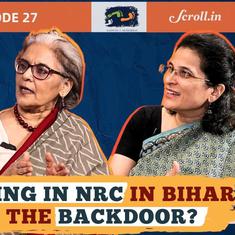Supreme Court stays Delhi HC order allowing citizens to feed stray dogs
The petitioner argued that street dogs were ‘unpredictable’ and could attack people.

The Supreme Court on Friday stayed a Delhi High Court order that held that citizens have the right to feed street dogs, reported Live Law.
In July, Justice JR Midha of the Delhi High Court had held that stray dogs have the right to food and citizens can feed them. The judge, however, had also said that when exercising the right to feed the dogs, “care and caution should be taken to ensure that it does not impinge upon the rights of others” or cause any problems to them.
The High Court had directed that dogs should be fed at areas designated by the Animal Welfare Board of India in consultation with Resident Welfare Associations or the municipal corporation.
On Friday, a bench of Justices Vineet Saran and Aniruddha Bose issued notices to the Animal Welfare Board of India, the Delhi government and other respondents on the petition filed against the High Court order by non governmental organisation Humane Foundation for People and Animals.
In its petition, the NGO said that that the High Court’s directions could lead to an increase in a stray dog menace. It argued that that the High Court failed to see the differences in the behaviour of stray dogs and dogs reared by humans.
“Given that stray dogs are not owned, they can be very unpredictable,” the plea said. “[Stray] Dogs may bite, attack and kill people and other animals for numerous reasons such as hunger, territorial aggression, overstimulation, redirected aggression, insecurity, fear, defense, genes, breed, injury, sickness, status in pack, etc.”
It said that on the contrary, dogs under a human’s supervision and control can be prevented from attacking people or other animals. This can be done by physical restraint, confining the dogs to private property and suppressing their aggressive tendencies with care and training, the petition said.
“This is not the case with stray dogs,” it said. “Therefore feeding in societies, streets, markets, parks or at any public places is a direct risk to citizens, pedestrians, two-wheeler riders, children and the elderly in particular as well as being violative of various existing laws.”
The NGO argued that the High Court’s order were contrary to the Supreme Court directions passed in 2009. The Supreme Court order had in 2009 directed “High Courts not to pass any order relating to the 1960 Act (Prevention of Cruelty to Animals Act) and the Animal Birth Control (Dog) Rules 2001”.
The petitioner also claimed that the High Court directions was based on several “blatantly misleading, irrelevant and factually incorrect statements and misinformation with regard to dog behaviour, problems associated with stray dogs, general information regarding dogs and as also with respect to the existing laws”.
The case originated due to a dispute between two residents of Inderpuri area of the national Capital, reported the Hindustan Times. Resident Maya Chablani had filed a petition before the High Court to restrain another resident Radha Mittal from feeding dogs near her property.
While the dispute was amicably resolved, the High Court appointed advocate Pragyan Sharma as amicus curiae and went on to frame guidelines for stray dogs with the help of Delhi government and Animal Welfare Board of India.









